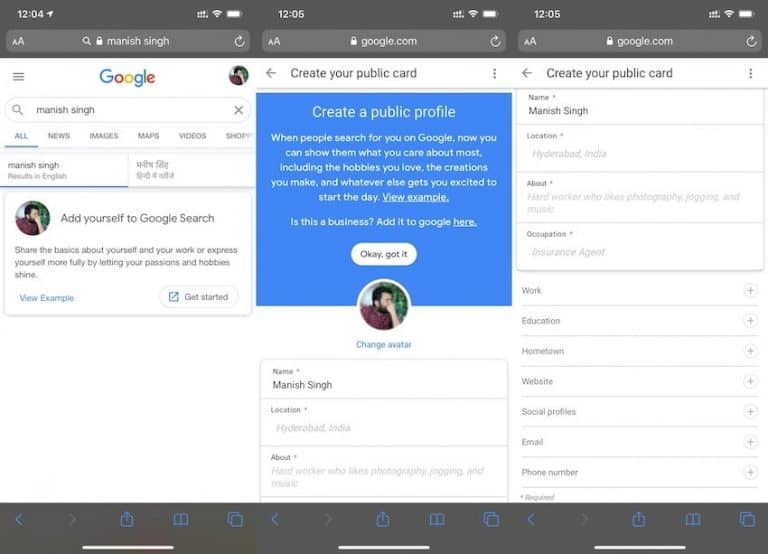Google People Card - should Linkedin be concerned?
Google tests "People Cards" in India
Google has launched “People Cards” in India, that allow you to easily find people who want to offer their services, competences or qualifications. India is certainly treated as a region where Google is testing its new tool.
People Card allows you to add your own bio, photo, links to the website and social profiles and most importantly from the recruitment point of view – work experience, education and contact details.
As can be seen above, there is space on the right to provide information on work experience, education, and contact details that will probably be available to search for.
Google has tried in the past to create its own Google+ social network to compete with Facebook and Linkedin. The Google+ project eventually failed to sustain the pressure from Facebook and Linkedin and was shut down.
What is the advantage of People Card over Google+, Facebook, Linkedin, and other social networks? The advantage is essential – People Card is not a social platform. Anyone with a Google account (currently in India) can create their card and be found by all other users of the Google search engine. You do not need to register on the new platform. You do not need to log in and check if someone sent us a message. You share your own card in the world’s largest database – Google search engine and immediately gain exposure to the whole world. Even the combined forces of Linkedin and Facebook cannot offer exposure this big.
We will see how Google will manage this project. It is difficult to say at the moment whether People Cards will become a real threat to Linkedin in the area of recruitment.
In my opinion, the approach that frees the user from the closed platform, such as Linkedin, is revolutionary and has a chance to seriously threaten Linkedin’s position, for which I keep my fingers crossed.
As we reflect on the potential of Google’s People Cards, it’s intriguing to consider the possibilities for integration with modern Applicant Tracking Systems (ATS) like Element. Such a union could significantly streamline the recruitment process, enabling recruiters to gather and process candidate data more efficiently. The future of recruitment may well be shaped by these innovative digital intersections.
DISCOVER ELEMENT!

Maciej Michalewski
CEO @ Element. Recruitment Automation Software
Recent posts:
Is it okay to use ChatGPT content as my own words?
The article analyzes the use of ChatGPT content in communication, pondering the ethics and appropriateness of using AI-generated content as one’s own.
Letters of Intent and Preliminary Contracts in Recruitment Processes: A Comprehensive Guide
Explore key aspects of preliminary employment and B2B agreements in our guide. Learn about the essential information required, the rights and obligations arising from such contracts, and how to handle missing details. Our guide offers professional advice and tips to facilitate understanding of these important legal documents.
GDPR-Compliant Recruitment: A Comprehensive Guide to Sourcing & Candidate Verification
Dive into our in-depth tutorial on GDPR-compliant recruitment. Master best practices for sourcing, direct search, job advertisements, and candidate verification to ensure full compliance with GDPR standards.
Complete Guide: Applying GDPR in Recruitment & Direct Search
Complete guide: applying GDPR in recruitment & direct search About the guide: GDPR in recruitment This guide on the processing of candidates’ personal data during
RPO – Recruitment Process Outsourcing: definition, functions, benefits
Explore Recruitment Process Outsourcing (RPO). Learn its definition, functions, and benefits. See how RPO can enhance your hiring strategy.
How to Respond to Negative Anonymous Employee Reviews
How to Respond to Negative Anonymous Employee Reviews – a complete guide for employers, with real life examples and solutions.

